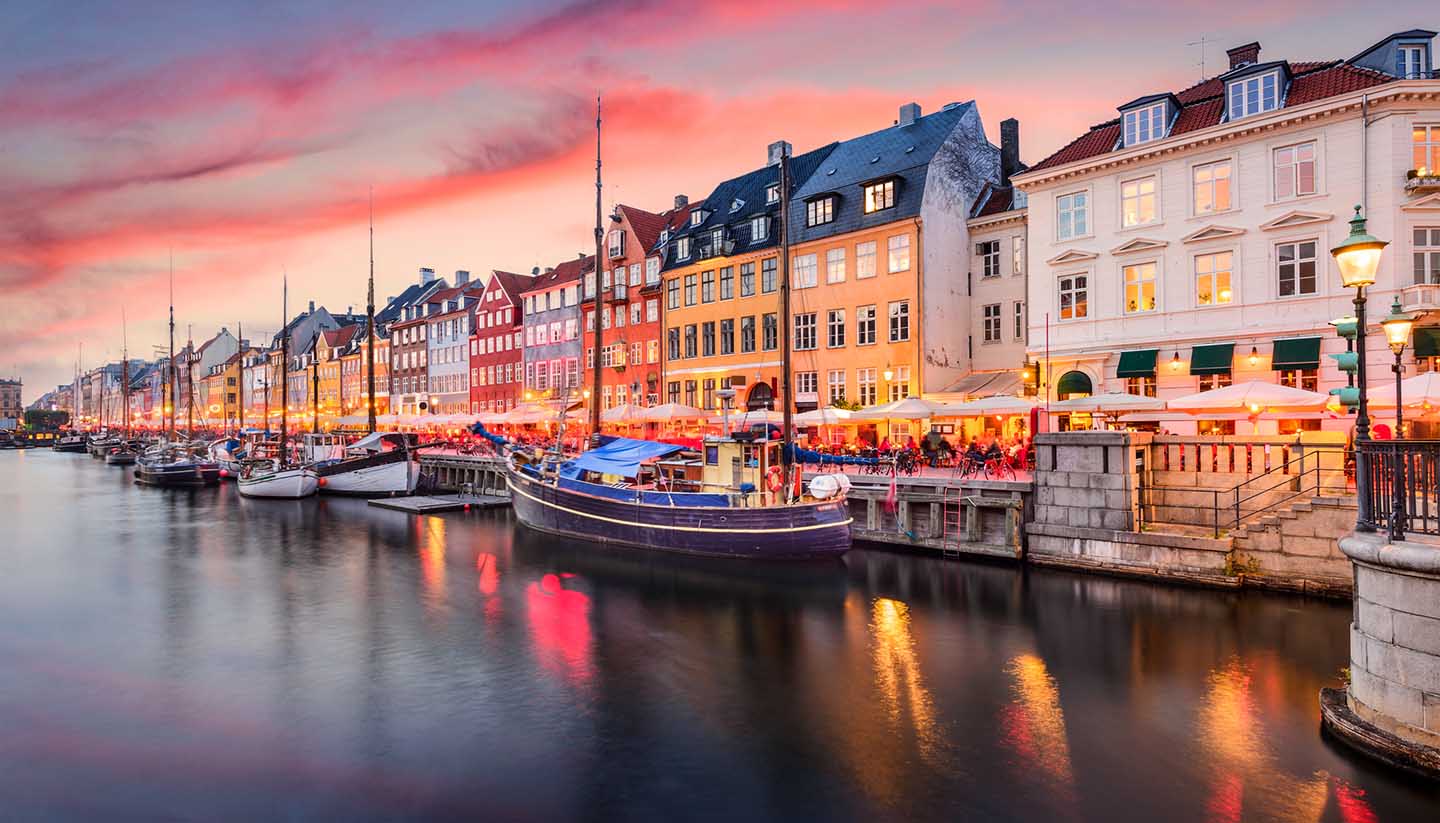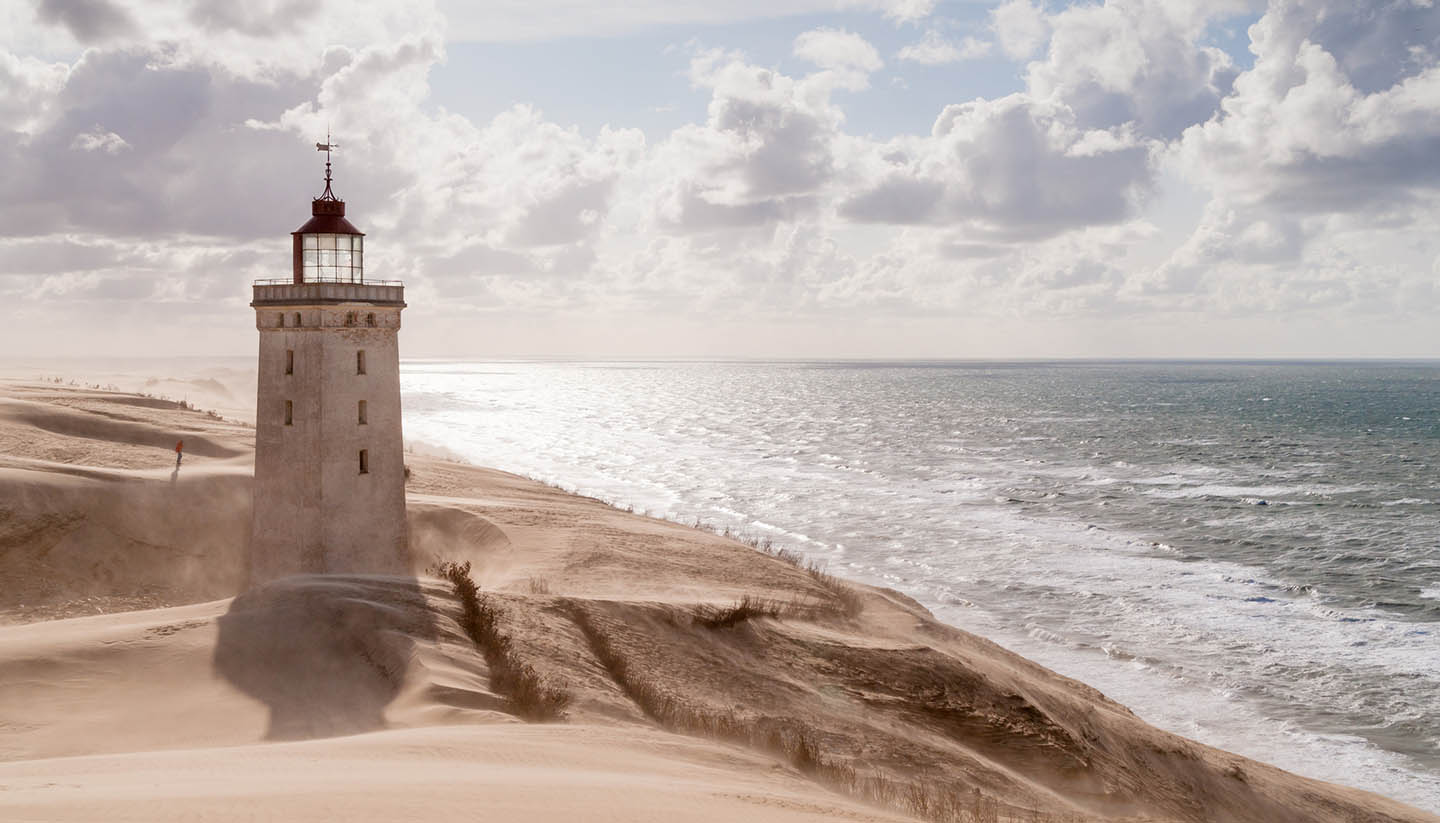Denmark travel guide
About Denmark
Consistently ranked in the top three of the world's happiest nations, Denmark is a prosperous country with strong social benefits and low income inequality ratings.
Copenhagen, the capital, is a cool, cosmopolitan city whose debonair inhabitants foster an affable atmosphere more typical of a small town than capital city. Synonymous with bold architecture and cutting-edge design, Copenhagen is also a culinary pioneer. The city's cobbled streets and windswept squares harbour some of the best restaurants in the world, most notably Noma, the brilliant brainchild of Rene Redzepi.
The pedestrianised city centre of Copenhagen is a breeze to navigate – visitors can feel the pulse of the city in the Meatpacking District, rummage around the antique shops in the multicultural Nørrebro neighbourhood, embrace communal living in Freetown Christiania, and of course there is Nyhavn, best known for its quaint harbour, colourful merchants' houses and throbbing nightlife.
But there's more to Denmark than its cool capital. Zealand, the island on which Copenhagen sits, is also home to Roskilde – once the Viking capital of Denmark. Along with a soaring UNESCO-listed cathedral, there's a museum housing some of the best-preserved Viking ships ever uncovered and a smattering of pretty cafés, shops and galleries. Since 1971, the city also hosts the annual Roskilde Festival with all proceeds going directly to humanitarian and cultural causes.
Odense on the island of Funen is also a worthy diversion. The birthplace of Hans Christian Andersen (his yellow house on a cobbled street in the centre of Odense is now a poet museum), Odense is a cultural gem where you don’t have to wrestle with throngs of tourists.
To the north, the Jutland west coast stretches for more than 500km (311 miles) from the marshlands of South Jutland to drifting sand dunes and wide sandy beaches of North Jutland. Skagen, Denmark's northernmost town on the east coast of the Skagen Odde peninsula in the far north of Jutland, is a favourite holiday destination among Danish families who come to bask on golden beaches and watch scintillating Scandinavian sunsets. Life is blissful here, it is little wonder that Denmark is one of the world’s happiest countries.
Key facts
43,098 sq km (16,640 sq miles).
5,773,664 (estimate 2019).
134 per sq km.
Copenhagen.
Constitutional monarchy.
King Frederik X since 2024.
Prime Minister Mette Frederiksen since June 2019.
Travel Advice
This travel advice also covers the Faroe Islands and Greenland.
Before you travel
No travel can be guaranteed safe. Read all the advice in this guide. You may also find it helpful to:
- see general advice for women travellers
- read our guide on disability and travel abroad
- see general advice for LGBT+ travellers
- read about safety for solo and independent travel
- see advice on volunteering and adventure travel abroad
Travel insurance
If you choose to travel, research your destinations and get appropriate travel insurance. Insurance should cover your itinerary, planned activities and expenses in an emergency.
About FCDO travel advice
The Foreign, Commonwealth & Development Office (FCDO) provides advice about risks of travel to help you make informed decisions. Find out more about FCDO travel advice.
Get travel advice updates
Sign up to get email notifications when this advice is updated.
Follow FCDO:
This information is for people travelling on a full ‘British citizen’ passport from the UK. It is based on the UK government’s understanding of the current rules for the most common types of travel.
The authorities in Denmark set and enforce entry rules. If you’re not sure how these requirements apply to you, contact the Danish Embassy in the UK.
Passport validity requirements
Denmark follows Schengen area rules. Your passport must:
- have a ‘date of issue’ less than 10 years before the date you arrive – if you renewed your passport before 1 October 2018, it may have a date of issue that is more than 10 years ago
- have an ‘expiry date’ at least 3 months after the day you plan to leave the Schengen area (the expiry date does not need to be within 10 years of the date of issue)
Check with your travel provider that your passport and other travel documents meet requirements. Renew your passport if you need to.
You will be denied entry if you do not have a valid travel document or try to use a passport that has been reported lost or stolen.
Visa requirements
You can travel without a visa to the Schengen area, which includes Denmark, for up to 90 days in any 180-day period. This applies if you travel:
- as a tourist
- to visit family or friends
- to attend business meetings, cultural or sports events
- for short-term studies or training
The requirements for working in Denmark are different.
If you’re travelling to other Schengen countries as well, make sure your whole visit is within the 90-day visa-free limit. Visits to Schengen countries in the 180 days before you travel count towards your 90 days.
Make sure you get your passport stamped on entry and exit.
If you’re a visitor, border guards will look at your entry and exit stamps to check you have not overstayed the 90-day visa-free limit for the Schengen area. If you overstay the 90-day visa-free limit, you may be banned from entering Schengen countries for up to 3 years.
If your passport is missing a stamp, show evidence of when and where you entered or left the Schengen area (for example, boarding passes or tickets) and ask the border guards to add the date and location in your passport.
At Danish border control, you may also need to:
- show a return or onward ticket
- prove that you have enough money for your stay – the amount varies depending on your accommodation
Staying longer than 90 days in a 180-day period
To stay longer, you must meet the Danish government’s entry requirements.
If you stay in Denmark with a residence permit or long-stay visa, this does not count towards your 90-day visa-free limit.
Read about passport stamping if you live in Denmark.
ID for travel from Denmark to Sweden
If you are travelling from Denmark to Sweden, see information on border control requirements.
Visas for Greenland and the Faroe Islands
Greenland and the Faroe Islands are not members of the EU. You do not need a visa to enter for tourism. If you plan to live and work there, you must get a work and residence permit – apply for residence in Greenland or the Faroe Islands.
New Schengen entry requirements
The EU’s Entry/Exit System (EES) is expected to start in October 2025. It is not currently in operation. The European Union will inform about the specific start date of the EES before its launch.
Read more information on the EU Entry/Exit System.
Border controls at Germany’s land borders
There are temporary border controls in place to travel into Germany. Check the entry requirements for Germany.
Vaccine requirements
For details about medical entry requirements and recommended vaccinations, see:
- TravelHealthPro’s Denmark guide
- TravelHealthPro’s Faroe Islands guide
- TravelHealthPro’s Greenland guide
Customs rules
There are strict rules about goods you can take into or out of Denmark. You must declare anything that may be prohibited or subject to tax or duty.
It is illegal to import whale products from Greenland or the Faroe Islands into the UK or EU. You could be fined up to £5,000 or given a prison sentence.
Taking food into Denmark
You cannot take meat, milk or products containing them into EU countries. There are some exceptions such as powdered baby milk, baby food and special foods or pet feed required for medical reasons.
Taking money into Denmark
Declare cash or travellers cheques if the value is 10,000 euros or more. You will get a certified declaration to show you brought it in with you. If you do not, your money could be seized when you leave.
Terrorism
There is a high threat of terrorist attack globally affecting UK interests and British nationals, including from groups and individuals who view the UK and British nationals as targets. Stay aware of your surroundings at all times.
UK Counter Terrorism Policing has information and advice on staying safe abroad and what to do in the event of a terrorist attack. Find out how to reduce your risk from terrorism while abroad.
Terrorism in Denmark
Terrorist attacks in Denmark cannot be ruled out.
Attacks could be indiscriminate, including in places frequented by foreigners.
Crime
Protecting yourself and your belongings
Crime levels are generally low, but pickpockets and bag-snatchers operate in crowded areas, mainly in Copenhagen.
Thieves use a variety of methods to distract you, particularly on crowded public transport. They sometimes also operate in hotel lobbies, cafes and restaurants.
Keep your personal belongings, including passports and money, safe. Keep an eye on luggage, including in the overhead baggage compartment, when travelling on trains to and from the airport.
Pickpocketing and bag-snatching are common in the following areas of Copenhagen:
- the central station
- Nørreport Station
- the main shopping street, Strøget
- other areas popular with tourists such as Christiania, Nyhavn and Kongens Nytorv
- inside Copenhagen Kastrup Airport
Take extra care in Christiania and Nørrebro, particularly late at night. There have been some instances of gang violence in these areas.
Laws and cultural differences
Dress code
It’s illegal to wear clothing that conceals your face in a public place in Denmark. There are legal exemptions – for example, face masks for health reasons. If you cover your face in public, you may get a fine of 1,000 krone (around £115). If you do it again, the fine can increase.
Illegal drugs
Illegal drugs, including cannabis, are strictly prohibited, even in small quantities. Severe penalties apply for possessing, using, or smuggling illegal drugs, including when transiting through airports.
You should expect long jail sentences of up to 10 years and substantial heavy fines.
Airports in Denmark have excellent technology and security for detecting illegal items. This is also used to scan the baggage of transiting passengers.
LGBT+ travellers
Same-sex relationships and marriage are legal in Denmark.
Read advice for LGBT+ travellers.
Transport risks
Road travel
If you are planning to drive in Denmark, see information on driving abroad and check the rules of the road in the RAC’s Denmark guide. The guide lists driving regulations and other legal requirements you need to be aware of.
You can use a UK photocard driving licence to drive in Denmark. If you still have a paper driving licence, you may need to update it to a photocard licence or get the correct version of the international driving permit (IDP) as well.
Hire car companies often have stricter requirements for their customers, such as a year of driving experience and a higher minimum age.
Cyclists often have the right of way. Always check cycle lanes before turning right. Pedestrians also often have right of way to cross ahead of you if you are turning at traffic lights.
Check if you need a UK sticker to drive your car outside the UK.
Bicycles and scooters
Many bicycle accidents happen when pedestrians do not give the right of way to bicycles. There are online guides in English on cycling in Denmark at Visit Copenhagen and the Danish Cyclists’ Federation (’Cyklistforbundet’).
Electric scooters are subject to road traffic rules. If you hire and use a scooter under the influence of alcohol, you could be prosecuted for drink-driving and you may be fined.
Arctic travel
Greenland is in the Arctic Circle, and most of it is very remote. Emergency medical assistance and search and rescue services are limited in these areas. See Arctic travel safety advice.
Greenland
Travel between towns is by air, sea or dogsled only. Arctic weather can affect travel, and you should be prepared for delays and cancellations.
During busy periods or when there is travel disruption, there may be no accommodation available unless you have booked ahead.
Supply chains are limited and travel times are long. Make sure you travel with sufficient prescription medication for all of your time in Greenland.
The Faroe Islands
Smaller roads may be unpaved and winding.
The weather can change quickly, and you should prepare appropriately for the activity you are planning.
Before you travel check that:
- your destination can provide the healthcare you may need
- you have appropriate travel insurance for local treatment or unexpected medical evacuation
This is particularly important if you have a health condition or are pregnant.
Emergency medical number
Dial 112 and ask for an ambulance.
Contact your insurance or medical assistance company quickly if you’re referred to a medical facility for treatment.
Vaccine recommendations and health risks
At least 8 weeks before your trip:
- check the latest vaccinations recommendations for Denmark, Greenland and the Faroe Islands
- see where to get vaccines and whether you have to pay on the NHS travel vaccinations page
See what other health risks you’ll face in Denmark, Greenland and Faroe Islands.
Altitude sickness is a risk in parts of Greenland. Read more about altitude sickness on TravelHealthPro.
Medication
The legal status and regulation of some medicines prescribed or bought in the UK can be different in other countries.
Read best practice when travelling with medicines on TravelHealthPro.
Denmark does not recognise UK prescriptions. If you need medication, you should speak to a local pharmacist (‘Apotek’), who will be able to tell you if you need a prescription from a local GP.
Healthcare in Denmark
FCDO has a list of medical providers in Denmark where some staff will speak English.
Health insurance cards in Denmark
To get medically necessary state healthcare in Denmark, you need a Global Health Insurance Card (GHIC) or a European Health Insurance Card (EHIC).
The NHS’s getting healthcare abroad webpage has details about:
- how to apply for a GHIC
- how to get temporary cover if you lose your card or it does not arrive in time
- who qualifies for a new EHIC instead of a GHIC
- what treatment counts as medically necessary
A GHIC or EHIC is not an alternative to travel insurance. You may have costs your GHIC or EHIC does not cover, including:
- changes to travel and accommodation bookings
- additional standard costs for treatment
- medical repatriation to the UK
- treatment that is ruled non-urgent
- private healthcare
- private clinics
There is also guidance on healthcare if you’re living in Denmark.
Health insurance cards in Greenland
You will not be refused treatment, but an EHIC or GHIC will not cover the costs unless you are resident of a Nordic country, under the reciprocal agreement, or a resident of Denmark. You can find more details about medical assistance available during a temporary stay in Greenland.
You may also have to cover the cost of medical evacuation.
Health insurance cards in Faroe Islands
You cannot use a GHIC or EHIC in the Faroe Islands. The UK has reciprocal agreements with the Faroe Islands, so British nationals can get the same medical treatment they would with a GHIC or EHIC. This arrangement is not a substitute for travel insurance.
If you travel to the Faroe Islands, you should still take your GHIC or EHIC with you. You’ll need to provide proof of identity and nationality, such as your UK passport.
Travel and mental health
Read FCDO guidance on travel and mental health. There is also mental health guidance on TravelHealthPro.
The Foreign, Commonwealth & Development Office (FCDO) cannot provide tailored advice for individual trips. Read this travel advice and carry out your own research before deciding whether to travel.
Emergency services in Denmark
Telephone: 112 (ambulance, fire, police).
Contact your travel provider and insurer
Contact your travel provider and your insurer if you are involved in a serious incident or emergency abroad. They will tell you if they can help and what you need to do.
Refunds and changes to travel
For refunds or changes to travel, contact your travel provider. You may also be able to make a claim through insurance. However, insurers usually require you to talk to your travel provider first.
Find out more about changing or cancelling travel plans, including:
- where to get advice if you are in a dispute with a provider
- how to access previous versions of travel advice to support a claim
Support from FCDO
FCDO has guidance on staying safe and what to do if you need help or support abroad, including:
- finding English-speaking lawyers, funeral directors and translators and interpreters in Denmark
- dealing with a death in Denmark
- being arrested in Denmark
- getting help if you’re a victim of crime
- what to do if you’re in hospital
- if you’re affected by a crisis, such as a terrorist attack
Contacting FCDO
Help abroad
See how to get help from the UK government abroad including in an emergency.
Help in the UK
You can call FCDO in London if you need urgent help because something has happened to a friend or relative abroad.
Telephone: 020 7008 5000 (24 hours)
Get travel advice updates
Sign up to get email notifications when this travel advice is updated.
Follow FCDO:
Risk information for British companies
The Overseas Business Risk service offers information and advice for British companies operating in Denmark on how to manage political, economic, and business security-related risks.




